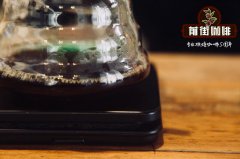Kenya Coffee Kenya Kahindu Manor introduction.

Professional coffee knowledge exchange more coffee bean information please follow the coffee workshop (Wechat official account cafe_style)
Located in Kenya below the equator of East Africa, the coffee beans planted are high-quality Arabica, thick and round in meat, with seven grades according to the size of the beans, and six grades of taste from top to bottom. "Kenya AA" is highly praised and respected, has a slightly sour and thick aroma, and is very popular among Europeans, especially in the UK. Kenyan coffee has surpassed Costa Rican coffee to become one of the most popular coffee.
No country in the world attaches so much importance to the production of high-quality coffee as Kenya, so Kenya can be regarded as the best model student for coffee producers in the world, because all Kenyan coffee must be uniformly purchased and graded by the Kenya Coffee Bureau (Coffee Board of Kenya, CBK) set up by the government every Tuesday. A public auction will be held in the capital of the officially established Narobi Coffee Exchange (the Nairobi Coffee Exchange).
Although Kenya and Ethiopia are adjacent to each other and both are big coffee producers in Africa, there are obvious differences in coffee varieties and flavors. Because the equator runs through the middle of the country, and the overall border is within 10 degrees north and south latitude, Kenya has two rainy seasons every year and can harvest coffee twice. Coffee is mainly grown in volcanic areas from the capital Nairobi to the mountains of Kenya, as well as Mount Elgon on the border with Uganda.
Kahindu Manor, located in the town of Mulaya, 80 kilometers north of the capital Nairobi, close to the Nakuru producing area, belongs to the coffee-growing area of the Kenyan mountains. The harvested coffee cherries are peeled, fermented after two washing procedures, and finally washed with clean water to remove the surface mucus, and then put in the sun on an elevated bed (the above process is also known as "Kenyan water washing". It is a rather complicated but delicate method of raw bean treatment in the area. In order to fully develop the whole washing process of coffee beans, they increase the processing time of fermentation and the drying period of raw beans, so they develop a special flavor different from that of traditional Kenya.
The special flavor of Kenyan coffee comes from two unique ways:
1. Unique varieties: although Bourbon species have been introduced in Kenya, Kent in India, and Blue Mountain Tibica in Jamaica, the world-famous bourbon varieties SL28 and SL34 first appeared in Kenya in the 1930s. These two varieties give Kenyan coffee a unique sour BlackBerry flavor.
two。 Unique Kenyan washing method (K72): Kenyan coffee is washed and fermented in a special two-stage way for up to 72 hours, giving Kenyan coffee a charming multi-layered taste.
Important Notice :
前街咖啡 FrontStreet Coffee has moved to new addredd:
FrontStreet Coffee Address: 315,Donghua East Road,GuangZhou
Tel:020 38364473
- Prev

Kenyan coffee Kenyan French missionary: introduction to West Hanna Manor.
Professional coffee knowledge exchange more coffee bean information please follow the coffee workshop (Wechat official account cafe_style) Kenya is one of the birthplaces of mankind, fossilized human skulls from about 2.5 million years ago have been unearthed in Kenya. Located in eastern Africa, the equator runs through the middle of the equator, with a land area of about 58367 square kilometers. It is bordered by Somalia to the east, Tanzania to the south, Uganda to the west, and South Sudan to the northwest.
- Next

Kenya coffee Kenya Karimiku processing plant Karimikui Factory introduction.
Professional coffee knowledge exchange more coffee bean information please follow the coffee workshop (Wechat official account cafe_style) Kenya is located in eastern Africa, the equator runs through the central region. It is bordered by Somalia to the east, Tanzania to the south, Uganda to the west and Ethiopia to the north. Kenyan coffee beans have a very variety of flavors, among which the change of acidity is the most attractive.
Related
- Does Rose Summer choose Blue, Green or Red? Detailed explanation of Rose Summer Coffee plots and Classification in Panamanian Jade Manor
- What is the difference between the origin, producing area, processing plant, cooperative and manor of coffee beans?
- How fine does the espresso powder fit? how to grind the espresso?
- Sca coffee roasting degree color card coffee roasting degree 8 roasting color values what do you mean?
- The practice of lattes: how to make lattes at home
- Introduction to Indonesian Fine Coffee beans-- Java Coffee producing area of Indonesian Arabica Coffee
- How much will the flavor of light and medium roasted rose summer be expressed? What baking level is rose summer suitable for?
- Introduction to the characteristics of washing, sun-drying or wet-planing coffee commonly used in Mantenin, Indonesia
- Price characteristics of Arabica Coffee Bean Starbucks introduction to Manning Coffee Bean Taste producing area Variety Manor
- What is the authentic Yega flavor? What are the flavor characteristics of the really excellent Yejasuffi coffee beans?

